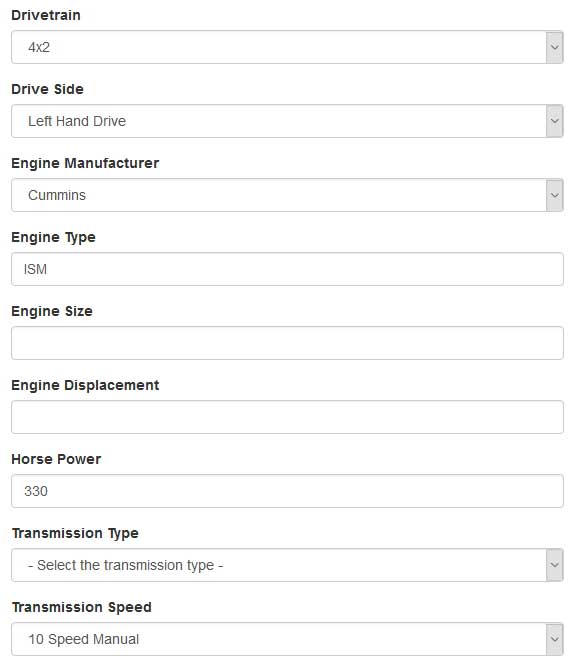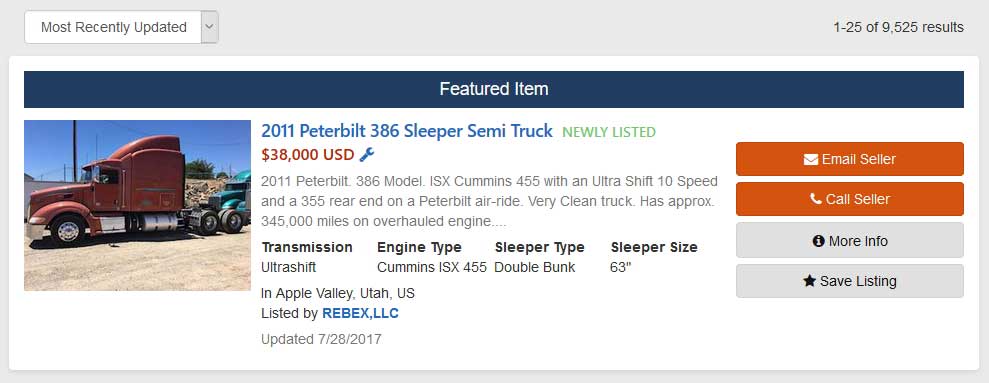Voiceover audio:
.jpg)
The tiniest bit of extra effort can make all the difference in the sales of your heavy equipment.
Selling machinery online is not daunting.
That being said, your results can vary based on the effort you put into your product listings. But these efforts aren’t difficult—you simply have to know how to supply buyers with the details they want to know. Fortunately, that’s what this guide is all about!
Whether you're looking to sell heavy equipment, machinery, commercial trucks, trailers, or parts online, here are five pro tips on getting better results and attracting more buyers.
Tip 1: Make sure your item is categorized properly.
This seems like a no-brainer, right?
The Most Accurate Item Category Wins
Always try to be specific regarding your selection of a category, manufacturer, and model. Failing to list your item according to its proper category severely limits your item’s visibility.
For example:
If your item is a “Skidder,” but you list it with “Assorted Forestry Equipment,” what do you think are the chances of your ideal buyer finding your listing? Slim.
Maximize Your Listing’s Visibility Choosing the Best Category
We understand that time is money and you may not feel like you have all day to properly list your inventory. However, taking just the necessary time to thoroughly understand your item’s product category can drastically increase its visibility with buyers and significantly speed up your sales process.
“So, how do I determine the best category?”
It is in the interest of most listing services to make properly categorizing your listings a snap. For instance, if you list your heavy equipment or trucks with My Little Salesman, as you begin to type what you believe is the best category for your item, existing category fields will begin to auto-populate according to what you type—allowing you to easily find the most appropriate category.

If you’re still unsure which category best represents your listing, approach your marketplace through the perspective of a buyer. Find product listings like yours to identify the proper category.
Tip 2: It pays to price your listing.
Having to request a price for your item is often the friction that will make buyers pass on your listing.
“If they want the price, they’ll call.”
That used to be more of the case. These days, many will simply bounce—scrolling down just a little bit to find an item with the price.
A price, even one too high or too low, gets people to look at your listing. When you fail to include a price, you’re either—
Creating a hurdle between buyers and information
Making buyers feel like you have something to hide
Both
“But I’m not allowed to list a price because of arrangements with my vendors or manufacturers.”
If red tape is keeping you from listing a price, list a range or a higher price with “discounts subject to specific conditions.”
Not sure how much to price your item in your listing?
If you're not sure what price to put on your listing:
If you begin to notice the listing receiving either an abundance of leads or not many, you can always adjust your price to help maximize leads or increase profits.
Worried that your asking price may be too low?
If you feel like you could ask a higher asking price for a particular piece of equipment, consider keeping the price and leaving out a few add-ons, attachments, or normally included items. After doing so, you can state in the description “additional items available for purchase with this item." This gives you the ability to negotiate with buyers to get a better price after they have already committed to contacting you.
Tip 3: Fill out your listing completely.
You can never say too much about your item.
The more detailed your listing is, the better. Explain the condition of the various parts, how it runs, what attachments are available, and the like. Be as descriptive and transparent as possible. Show all sides of the item—warts and all. Buyers will appreciate your honesty and begin to trust you. Trust is king.
Here are just a few of the specifications you can fill out for a commercial truck for sale:

Take the time to add photos, specifications, and a comprehensive description. Document every inch of the item with photos—leaving zero mystery. The more detailed and complete the listing, the higher likelihood that buyers and search engines will take interest in your listing.
Tip 4: Respond quickly to all buyer inquiries.
Be Fastest on the Draw
In the grand scheme of online heavy equipment or truck listings, your item is not special. There are likely thousands just like it online and for a similar price. And it doesn’t necessarily need to stand out—but you, on the other hand, do. Your attentiveness to their needs is the reason they’re buying your truck or backhoe. But you have to earn it.
Regardless of your item, if you can beat your competition with the speed at which you respond to buyer inquiries, you will have out-worked them and earned the buyer’s business.
If you ever think, “Eh, I’ll call them back tomorrow,” you may as well kiss that lead goodbye—because your competition is calling them back now—even if to just leave a voicemail.
The faster you respond to telephone or email inquiries, the better your chances are of earning their business.
Think Beyond Local
With today’s freight and transportation options—barring any contractural understandings—the country and even the world is your sales territory. With transaction processing technologies and instant shipping quotes, the logistics behind selling items to buyers in far-flung areas have never been more manageable.
Whether or not you want to (or are allowed to) be a long-range seller is another story.
Tip 5: Consider boosting listing visibility with ads.
Give your listing a boost—for less than you’d think.
Whether it means upgrading your listing plan for top billing or creating ads for your listings on search engines or social media, paid ads featuring your listings can put your inventory in front of more potential buyers than standard listings.
Featured Listings: Built-in Visibility Bumps
A quick, easy, and surprisingly affordable way to get your items to the top of the marketplace listing may include paying a few more dollars for a visibility upgrade. For example, for $10 per listing, per month, a "featured listing" is an inexpensive way to make sure your listing always stays near the top of the results and is visible before other competing items for sale. Think of it as an inexpensive way to cut in line in front of your competition.

Bonus Tip: Think Like a Buyer
When putting your listing together, think like a buyer. If you were in their shoes, what would you want to see? What would make your listing stand out?
If you didn't see an asking price, would you simply move on to the next listing?
What kind of pictures would you want to see?
What kinds of maintenance logs and other documentation would you expect?
What would it take for you to take a deep interest in a particular listing?
Compile a list of what would make a listing stand out to you from the buyer’s shoes. Make sure that your listings contain these elements—meeting your standards as a buyer so you can win as a seller.
Pssssttt...are you a private seller?
If you're a private seller, we've created THE guide to listing your construction equipment or commercial trucks online for sale. Now that we mention it, the piece you're reading is one the steps featured in this guide. It's looks like you're already half-way there!
My Little Salesman Has Your Back
Whether you're looking to sell heavy equipment, commercial semi trucks, or parts online, we can help. Since 1958, My Little Salesman has been putting solutions in buyer's hands and sales in seller's pockets.
Learn how to get started selling you heavy equipment items with My Little Salesman today.